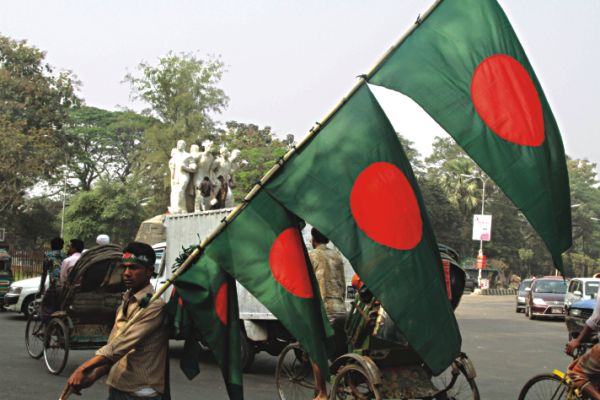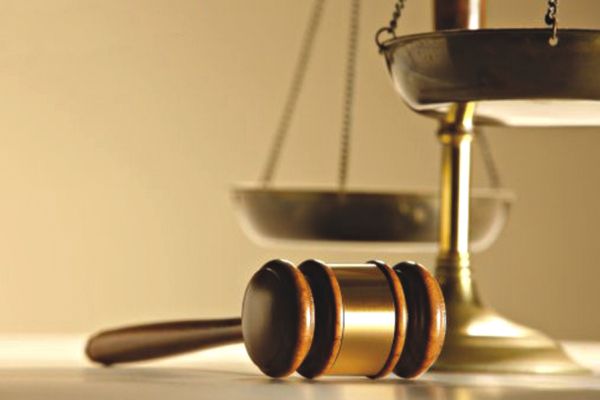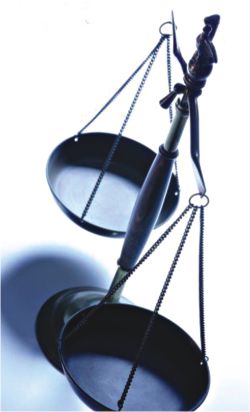
Inside
Original Forum |
| Readers' Forum |
| Our War Crimes Trials: Making it Happen -- Ziauddin Choudhury |
| Putting an End to Fatwa Violence -- Arafat Hosen Khan |
| Girl on Girl: How we perpetuate abuse and violence -- Shahana Siddiqui |
| The Price of Violence -- Interview with Dr. Julia Ahmed |
| Equal but Different: Gender discrimination in immigration rules -- Farah Huq |
The Crime Never Considered a Crime --- AZMM Moksedul Milon |
Women in the Workplace: Gender-specific challenges in the corporate world --- Olinda Hassan |
Women's sports in Bangladesh -- An Encouraging Year -- Naimul Karim |
| Her vindication, he supports -- Shayera Moula |
| An Aconcaguan Birth --Wasfia Nazreen |
| On Objectification of Women in Mainstream Hollywood Movies --Rifat Munim |
| Silence of the Voices --Zoia Tariq |
Our War Crimes Trials: Making it Happen
ZIAUDDIN CHOUDHURY describes the aspirations -- and challenges -- of the war crimes trials.
The seminal war crimes trials in modern history were the Nuremberg Trials following the Second World War, and the Tokyo Trials held about the same time. The Nuremberg Trials were held in two phases. In the first phase held in 1945-46, 24 of the most senior captured Nazi leaders were tried. Among them was Hermann Göring, the Commander-in-Chief of Luftwaffe (German Air Force), and the country's most senior politician. In the next phase there were 12 trials before the Nuremberg Military Tribunals (NMT) from December 9, 1946 to April 13, 1949. In total, 142 of the 185 defendants were found guilty of at least one of the charges. Twenty-four persons received death sentences, of which 11 were subsequently converted into life sentences; 20 were sentenced to life imprisonment, 98 were handed down sentences of varying lengths and 35 were acquitted.
 Star Photo
Star Photo
The International Military Tribunal for the Far East (IMTFE), also known as the Tokyo Trials, the Tokyo War Crimes Tribunal was convened on April 29, 1946, and it lasted until November 1948. Three types or classes of war crimes were tried by the Tribunal. "Class A" crimes for those participating in a joint conspiracy to start and wage war, "Class B" crimes were for committing atrocities or crimes against humanity; and "Class C" crimes were for the planning, ordering, authorisation, or failure to prevent such transgressions at higher levels in the command structure. Twenty-eight Japanese military and political leaders were charged with Class A crimes, and more than 5,700 Japanese nationals were charged with Class B and C crimes.
Why am I bringing the famous war crimes trials into discussion? Surely not to bring any comparison between the war crimes trial now going on in Bangladesh with those in Nuremburg or in Tokyo more than 60 years ago. The trials in Nuremburg or in Tokyo are not comparable with what we are up to either in scale or in effort. I am bringing these famous trials to discussion to point out the enormous amount of time that was taken to bring them to closure. The Nuremburg trials (the two phases) took close to six years for conclusion. The Tokyo trials took three years.
War crimes trials take time. Look at some of the most recent trials. The trial of Slobodan Milosevic of former Yugoslavia took five long years (although he died before conviction). The trial of Charles Taylor of Liberia lasted three and a half years. The trial of Kaing Guek Eav (better known as Comrade Duch) of Cambodia lasted three years (although he spent eight years in confinement earlier). All of the trials were successful, however, in proving charges against the individuals in unequivocal terms. They were tried and punished (except in the case of Milosevic who died of heart attack before the sentence).
 Christine Balderas-photodisc/getty Images
Christine Balderas-photodisc/getty Images
It has taken four decades to hold a tribunal to bring to justice the people who had conspired, aided and abetted a war against civilians, and committed atrocities against innocent masses in Bangladesh in 1971. It is no Nuremburg or Tokyo. It is our own tribunal to bring people to justice who we should have tried decades ago, but failed for political reasons, earlier imposed externally, and later by enemies within us. It is with renewed hope and aspirations that the nation greeted the news of formation of a tribunal and regeneration of the long awaited trial of the perpetrators of crimes against humanity. We started the process all over, but will the endeavours yield the result we have waited for? How long will it take for justice to happen at last? Do we have the political will and support for a long drawn out process?
One can argue that the Bangladesh trials should not be a long drawn affair; we are not trying hundreds of war criminals as in the cases of Nuremburg or Tokyo. These should not last for years. But on the other hand, look at other recent trials where single individuals were arraigned for war crimes, and see how long the trials have lasted.
A key aspect of these trials is proving before the trying courts the charges against the suspects beyond any reasonable doubt. This means strong and effective prosecution. Most of this effective prosecution comes from investigative reports of skilled professionals, evidences both direct and indirect, and persuasive arguments. And quality prosecution needs time. A case prosecuted on poor evidences will either fall through the trial court, or will not hold up later on appeal. Better we spend time on iron clad investigation and production of strong evidence than push for hasty prosecution that will later free the accused of the charges.
This leads us to the next imponderable -- can we sustain a long trial that may last longer than the term of the current government? Will any change in government put fetters on the trial?
 |
|
Christine Balderas-photodisc-getty Images |
The principal reason why it has taken more than 40 years to have the war crimes trials in Bangladesh was lack of political will to do so, albeit early in our history (1973) our efforts were frustrated by external pressure. The issue was put in cold storage, in fact forgotten, with dramatic changes in our political fortune in 1975. These changes brought new actors in our political scene who sought support from anywhere to sustain them politically, including support from the very elements that had aided and abetted the war crimes of 1971. It is no wonder that any attempt to revive the war crimes trials in the later years would be throttled by the political forces that stood to gain from the political support of the collaborators of war crimes.
Our war of liberation happened more than 40 years ago, and it lasted less than a year. But what we lost in that short period is comparable with the damages in life and property that one sees in wars that last much longer. This is because our enemies launched a war not against another army, but against unarmed civilians. This was a pogrom of sorts against a people of a particular ethnicity, language and political ideology. This war brought about more devastation and crimes against humanity than any regular war because the authorities who led this war were aided and abetted by a group of people from within us. These people were motivated by a false ideology that was rooted not in our soil, our culture, or political identity.
We are at a crossroads of our political history. After many years of waiting, the nation got an opportunity to vindicate its grievances for wrongs done to its millions in the name of a war. We have not been able to round up all of the culprits responsible for the atrocities of 1971, many escaped either to another land or to another world. But we have some who have been identified with commission of these crimes, and the nation is hoping that we see some justice done to the victims of 1971 atrocities. Some among those arraigned may be of an age that may be deemed too old for trial by some. For those who think so, we may remind them that some people tried for collaboration with the Nazis were past 90 when they were arraigned. Age is immaterial when a person is accused of crimes against humanity, regardless of when these were committed.
In a seminar on War Crimes and Trial held by the Center for the Study of Human Rights of London School of Economics a few years back, speakers held that the Nuremberg trials provided important acknowledgement for the victims of the most appalling war crimes and that was important. This is because the main customers of war crimes trials, like any trials, are the victims. Victims want acknowledgement that a crime against them or their loved ones was committed and the persons responsible for the crime have been held accountable and brought to justice. Victims want some official recognition of what happened, and who did it. For the victims this is part of a healing process.
It has been said that war crimes trials arise from high expectations that cannot possibly be met. Perhaps the Bangladesh war crimes trials have also raised such expectations. More importantly, we do not know if the trial will be successful enough to mete out punishment to individuals who brought limitless grief to the nation as a whole. We also do not know that, given the length of time such trials take, if the current war crimes tribunal will be allowed to complete its job unfettered by any political change in the future. But we do know that in a self-respecting nation it is imperative that criminals who aided and abetted atrocities and crimes against humanity cannot, are not, left unpunished. We do know that such trials can also provide a deterrent effect for the future.
Experts on war crimes trials have stated that the recent history of war crimes trials confirms that they are most successful when they have been pursued in stable political environments. The trials are most effective with high functioning institutions capable of guaranteeing compliance with the rule of law. Given the nature of politics in our country and changes in government we often see that acts of one government are trashed when the opponents rise to power. One expects these in acts that are politically motivated. But acts that are aimed to restore the dignity and honour of a nation, acts that are meant to alleviate grievances of a nation, should be above any political debate and respected across the entire political spectrum. The war crimes trial and the tribunal created for that purpose are among such sacrosanct acts. These may take time, but with patience and political will from all, the trials may prevail.
Going forward, what we need to ensure is that the institution for war crimes trial that we have created function properly and guarantee compliance with the rule of law. We need to ensure that the quality of investigation and prosecution is not sacrificed. We need to demonstrate both to those who are tried, and to the world at large, that the crimes these people committed were proved beyond shadow of a doubt, and the retribution they receive will prevail. That way we will not need to worry that a change in government will mean a change in our national stand against the people who had defiled our people's lives, dignity and honour in the name of war. We will not worry that this war crimes trial is a march against time.
Ziauddin Choudhury works for an international organisation in the USA.